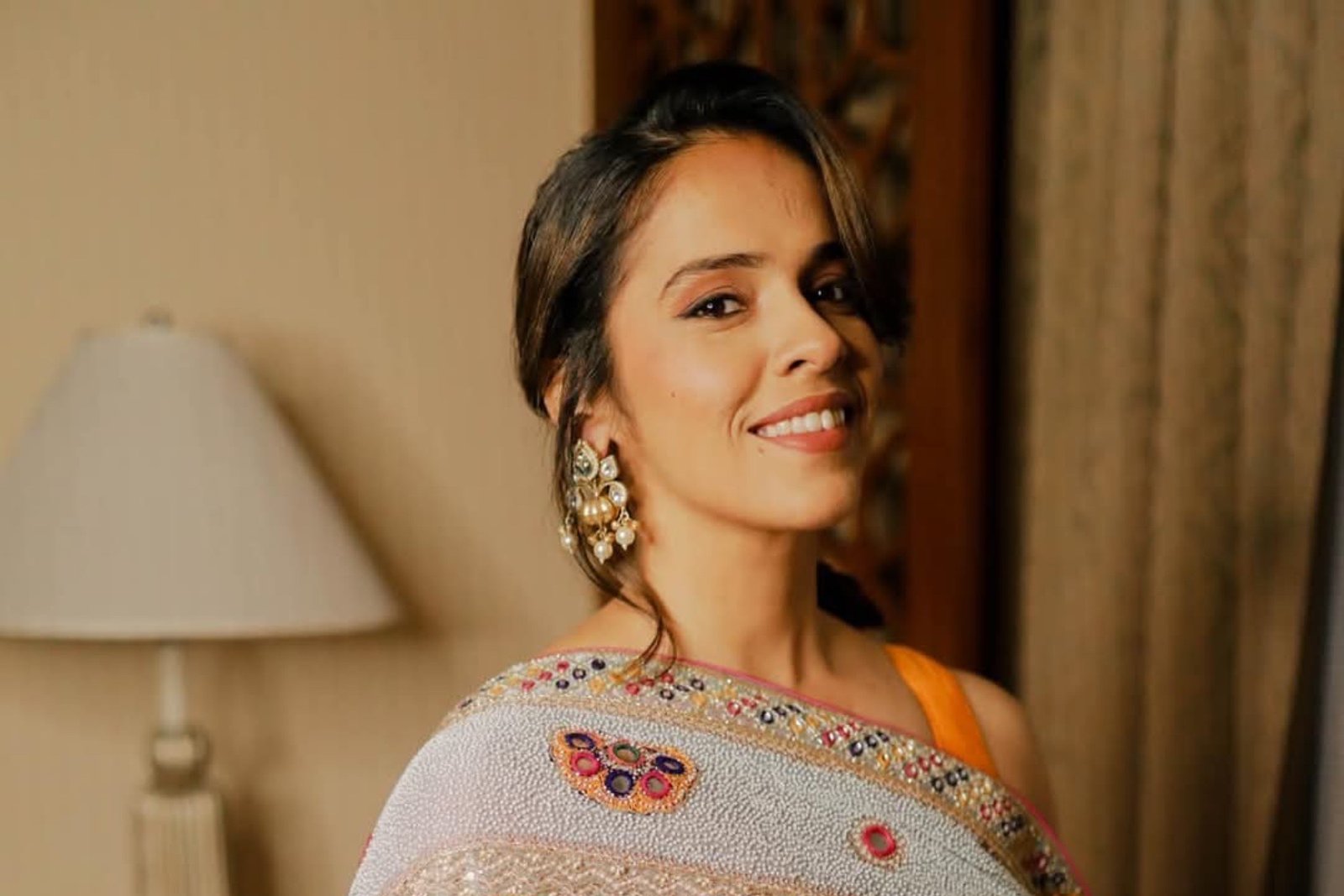The majesty of Olympian medallist Saina Nehwal’s persona spread out before us like a complex web as her voice crackled with emotion with Downtown Mirror’s Shikha Duggal. “The most pivotal moment, if I take away the medals and trophies, was following my consecutive defeats in the quarterfinals of the World Championships! I was unsuccessful seven times. Feeling trapped, as though I was giving everything I had but still lacking something, was more important than simply losing.
 During that time, I was put to the test both personally and as an athlete,” she said! “It was more than just winning when I made my breakthrough and took home a gold on the eighth try. Even though the benefits weren’t seen right away, it was about perseverance, patience and faith in the process. That changed me. I discovered that perseverance and the ability to bounce back from failures are more important factors in success than skill or hard effort.”
During that time, I was put to the test both personally and as an athlete,” she said! “It was more than just winning when I made my breakthrough and took home a gold on the eighth try. Even though the benefits weren’t seen right away, it was about perseverance, patience and faith in the process. That changed me. I discovered that perseverance and the ability to bounce back from failures are more important factors in success than skill or hard effort.”
That’s Saina Nehwal for you! She has made a lasting impression on badminton, leaving her name inscribed beside the greatest of all time, like a meteor lighting over the skies. Nehwal’s impressive resume, which includes an astounding number of international titles, Olympic bronze and three Commonwealth Games gold medals, shows her incredible journey from Hyderabad to worldwide superstardom!
Saina Nehwal, the unconventional badminton champion, opens up about her personal experiences in an exclusive interview for our upcoming digital issue…
Shikha Duggal: Today, a lot of young athletes struggle with the demands of social media recognition and quick achievement. How do you envision the sport’s development, having witnessed both the pre-social media and digital eras?
Saina Nehwal: The sport has seen significant change, not only in terms of gameplay but also in how athletes deal with expectations, pressure and fame. Prior to social media, the main criteria for success were rankings, tournament victories and the opinions of coaches or federations. You had time to develop, make mistakes and get better without the incessant chatter. Young athletes are now immediately scrutinised! They can become famous overnight with one strong performance and they can receive scathing criticism with one poor performance. Although social media can be inspiring, it also increases pressure since users demand accomplishment right now, forgetting that real greatness takes years of work. I advise young athletes to put more emphasis on their path than on approval. Discipline, patience and resilience are what really create champions; likes and trends come and go. Allow your passion and hard work to determine your value instead of social media.
Shikha Duggal: You’ve talked a lot about how your career has been shaped by setbacks. Have you ever thought about quitting?
Saina Nehwal: Yes, particularly during the 2016 Olympics, when I suffered a serious injury that required surgery. Indeed, there were times when the hardships seemed insurmountable—tough losses, injuries and the disappointment of not succeeding even after giving it your all. Managing my injuries was the hardest part, especially when I was unable to move how I wanted to. I did consider stepping away at times when I wondered whether I would ever be able to return to my best self. My passion for the game, however, was what drew me back. Badminton is not just something I play; I’ve always thought of it as a part of who I am. I persisted because I enjoyed the rush of competition, was driven to succeed once more and felt like I had more to offer. The encouragement I received from my family, coaches and fans also served as a reminder of my initial motivation. Additionally, when your parents are so supportive, they will always encourage you to go to the gym and complete your exercises, even if you are injured. They also always keep me company in the gym so that I don’t feel alone during that trying time of recovery.
Indeed, there were times when the hardships seemed insurmountable—tough losses, injuries and the disappointment of not succeeding even after giving it your all. Managing my injuries was the hardest part, especially when I was unable to move how I wanted to. I did consider stepping away at times when I wondered whether I would ever be able to return to my best self. My passion for the game, however, was what drew me back. Badminton is not just something I play; I’ve always thought of it as a part of who I am. I persisted because I enjoyed the rush of competition, was driven to succeed once more and felt like I had more to offer. The encouragement I received from my family, coaches and fans also served as a reminder of my initial motivation. Additionally, when your parents are so supportive, they will always encourage you to go to the gym and complete your exercises, even if you are injured. They also always keep me company in the gym so that I don’t feel alone during that trying time of recovery.
Shikha Duggal: Just as important as the physical game is the mental one. How has your attitude toward competitiveness, pressure and self-doubt changed over time?
Saina Nehwal: I viewed pressure early in my career as something I had to overcome, a burden I had to bear in order to establish my worth. Self-doubt occasionally surfaced, often following setbacks or injuries and I would wonder if I was good enough or if I was doing enough. It felt like a fight not only against rivals but also against everyone else’s and my expectations. I’ve developed a new perspective on pressure throughout the years! I began to use it as fuel rather than to be afraid of it. I came to see that the reason for the pressure is that I have high expectations for myself, which is a privilege rather than a burden. Although I still have occasional self-doubt, I’ve learned to trust my planning and concentrate on the things I can manage. Winning is fantastic, but what really counts is developing as a person and as an athlete. Sometimes injuries may test you, but ask yourself if you’re prepared to compete against the finest in the world. If not, just get ready for the next tournament when you’re ready to defeat the best.
Shikha Duggal: Who were the unseen contributors to your success—those who were essential but seldom received recognition?
 Saina Nehwal: My mother, who is a homemaker, told me this in 1999 while I was at summer camp, that I’m the finest in the world for her and that I’ll win an Olympic medal… Giving me that type of guidance and information at the age of nine helped me to dream big because, when I was in fifth grade, I wanted to be a doctor. I assumed that since my father is an agriculture scientist, I would pursue that career path, but she made it extremely evident that I could be a successful athlete by observing that I give every training session and competition my all. My coaches were quite impressed and were certain that I might succeed as a major player in the future. My father would take me on a bus ride at 4 am for 25 km up and down, drop me off at school at 8:30 am and then, after school, at 3:30 pm, my mother would take me on another bus ride for another 25 km up and down, returning by 10 pm to eat and sleep. We continued doing this for three or four years and the results were evident. I was chosen for the senior international squad at the age of twelve because I was performing so well in state and national competitions! Since there weren’t any women badminton players who were well-known on the world scene before me, I didn’t have a role model to aspire to.
Saina Nehwal: My mother, who is a homemaker, told me this in 1999 while I was at summer camp, that I’m the finest in the world for her and that I’ll win an Olympic medal… Giving me that type of guidance and information at the age of nine helped me to dream big because, when I was in fifth grade, I wanted to be a doctor. I assumed that since my father is an agriculture scientist, I would pursue that career path, but she made it extremely evident that I could be a successful athlete by observing that I give every training session and competition my all. My coaches were quite impressed and were certain that I might succeed as a major player in the future. My father would take me on a bus ride at 4 am for 25 km up and down, drop me off at school at 8:30 am and then, after school, at 3:30 pm, my mother would take me on another bus ride for another 25 km up and down, returning by 10 pm to eat and sleep. We continued doing this for three or four years and the results were evident. I was chosen for the senior international squad at the age of twelve because I was performing so well in state and national competitions! Since there weren’t any women badminton players who were well-known on the world scene before me, I didn’t have a role model to aspire to.
Shikha Duggal: You were exposed to a variety of cultures and languages when you were young, having moved from Haryana to Hyderabad. What effects did this cultural change have on your outlook on life?
Saina Nehwal: Hard work and perseverance were strongly rooted qualities in Haryana, where I grew up with a strong, determined mindset. In contrast, Hyderabad exposed me to a more varied setting where I engaged with individuals from various backgrounds and adjusted to a new way of life. This change, eventually, had a significant impact on how I played badminton. I learned how to be flexible, which is crucial in athletics. I had previously learned to adapt to numerous environments early in life, so it was simpler to deal with diverse playing styles, train under new coaches and compete against a variety of opponents. By combining flexibility and discipline, the cultural shift also assisted me in creating a more strategic and open-minded approach to the game. I was fortunate to have my family’s strong support when they all moved to Hyderabad. They were more like buddies once I shifted to Hyderabad. Within a year after coming from Haryana to Hyderabad, I didn’t have time to establish many acquaintances at school or in the stadium. My parents enrolled me in summer camp so I could practice badminton, but because the sessions were exhausting, the routine changed to stadium, school, stadium and sleep at night. I lacked the time to socialise or form friendships.
Shikha Duggal: Every athlete has a ritual they follow after a game to rejuvenate. We would, however, like to know which superstition you find most difficult to abandon?
Saina Nehwal: Whether I win or lose, I always take some time to think after a game. I recall the positive events if I win to boost my confidence. I inspect what went wrong but try not to think about it too much if I’ve lost. My regimen also includes rest, hydration and a healthy supper to help me recuperate and get ready for the next challenge. In terms of superstitions, I’ve had a few throughout the years! I’ve always tied my shoelaces in a certain way before a game because it makes me feel prepared anyway. Before serving, I also tap my racket on the court, which is sort of like pressing a reset button. Although I didn’t start it intentionally, it gradually developed into a minor ritual that gives me a sense of control. Some habits simply stick with you and even the tiniest routines can help you stay focused and comfortable in a high-pressure activity like badminton.
Shikha Duggal: An athlete’s life is regimented, self-disciplined and frequently lonely. Have you ever wished for a typical, unstructured day at some point?
Saina Nehwal: I rarely wake up without an alarm, so if I could plan my ideal “non-athlete” day, it would begin with that! I would spend time with my family, especially my puppy, Chopsy and have a leisurely breakfast and perhaps some tea. No urgency, no training plans—just a leisurely morning. We only take Sundays off to watch the Kapil Sharma Show or go to the movies, but it gets hard to move on Sundays since it’s so exhausting to push throughout the week. Additionally, there are 17 tournaments in a year, so in the back of our minds is the constant reminder that we need to get enough sleep and get ready for the following week so that our bodies are functioning properly and performing well. Professional athletes are constantly thinking about winning an Olympic medal or a world championship, so they must be strict most of the time.
Shikha Duggal: Athletes frequently make sports their whole identity. How can you accommodate Saina as a person as well as Saina as an athlete?
Saina Nehwal: Every choice I made for years was based on performance, competition and training since badminton was my entire universe. I came to understand, however, that although being an athlete is a significant aspect of who I am, it is not who I am. I prioritise things outside of the sport that make me happy in order to make room for Saina, the person. My partner and my dog, Chopsy, in particular, help me stay grounded when I spend time with them. Away from the pressure of competition, I also enjoy travelling because it allows me to see things from a different angle. I can de-stress and re-energise by doing even basic things like watching movies or having chats unrelated to badminton. Giving back, whether it be through coaching young athletes, sharing my experience, or sponsoring sports-related causes, has been another crucial component. Ultimately, I will always have a strong connection to badminton, but I’ve come to value life off the court. Being Saina, the athlete, but also Saina, the wife, the daughter, the traveller, the dog lover and just a person who appreciates life’s small pleasures, is all about finding balance.
Stay tuned to Downtown Mirror for all the latest updates.


